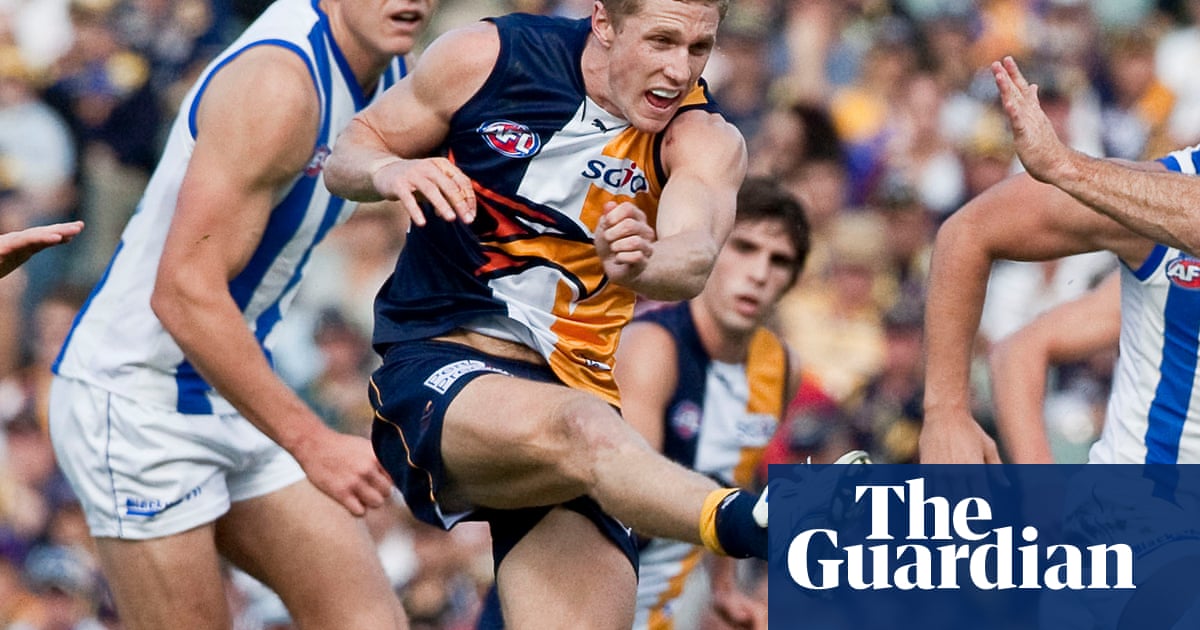The West Coast premiership player Adam Selwood has died aged 41, three months after thedeath of his twin brotherand fellow former AFL player Troy Selwood.
Adam Selwood played 187 games for West Coast, including the 2006 premiership, before retiring from football in 2013.
He died in Perth on Saturday morning.
“We are heartbroken by the passing of Adam earlier today. Words cannot express the grief and sadness we feel,” the Selwood family said in a statement via theAFLon Saturday.
“Adam was a loving husband, and an incredible father to Lenny and Billie. We are devastated to lose such a wonderful husband, father, son and brother.
“We will miss Adam deeply – his spirit, his kindness, and the joy he brought to every room. His determination, the lessons he shared, and his infectious personality will stay with us always.
“Adam had a unique ability to make people feel special, and our family was lucky to experience that every day.
“We kindly ask for privacy as we navigate this difficult time.”
Members of the AFL’s famous Selwood family, midfielders Adam and Troy were brothers of the Geelong champion Joel Selwood and the former Eagles and Cats midfielder Scott Selwood.
Troy Selwood died in February and was remembered by Adam as his “best mate” at his funeral.
“Having an identical twin is both a rare privilege and wonderfully complex,” Adam said in his eulogy for Troy.
“A twin is more than a sibling, they are a constant presence, a built-in best mate and someone who understands you in a way that no one ever could.
“Troy wasn’t just my brother; he was my mirror, my fiercest competitor, my greatest ally and the one person that knew what I was always thinking.
“Losing him has left a massive hole in my life.”
Adam Selwood’s premiership teammate Adam Hunter died in the same week as Troy Selwood in February.
Hunter, who also played alongside Scott Selwood with the Eagles, was 43.
The former West Coast coach Adam Simpson paid tribute to Adam Selwood when news of his death broke on Saturday.
“I don’t know what to say. It was a pleasure to work with Adam briefly,” Simpson said on SEN radio.
“It breaks your heart.”
The AFL chief executive, Andrew Dillon, said he could not imagine the pain of the Selwood family.
“On behalf of the AFL and all of our clubs, I want to send our love to his wife Fiona and their two children, to Maree and Bryce Selwood, Joel and Scott, and their families, and all of Adam’s many friends and colleagues and past team mates at West Coast and across football,” Dillon said in a statement.
Originally from Bendigo, Adam Selwood moved to Perth when he was drafted by West Coast in 2002.
He joined the Eagles’ coaching ranks after his retirement as a player, working with the club’s AFL and AFLW teams.
Scott Selwood was due to be at the MCG on Saturday as an assistant to Collingwood coach Craig McRae, but was granted personal leave.
In Australia, the crisis support serviceLifelineis 13 11 14. In the UK and Ireland,Samaritanscan be contacted on freephone 116 123, or emailjo@samaritans.orgorjo@samaritans.ie. In the US, you can call or text theNational Suicide Prevention Lifelineon 988, chat on988lifeline.org, ortext HOMEto 741741 to connect with a crisis counselor. Other international helplines can be found atbefrienders.org
